Khamenei's sons mourn Sinwar at Hamas office in Tehran
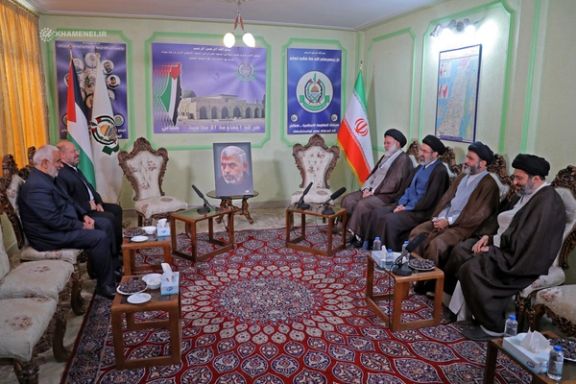
The sons of Supreme Leader Ali Khamenei visited the Hamas office in Tehran on Friday, extending condolences for the death of Yahya Sinwar, according to the Supreme Leader's official website.

The sons of Supreme Leader Ali Khamenei visited the Hamas office in Tehran on Friday, extending condolences for the death of Yahya Sinwar, according to the Supreme Leader's official website.
Mojtaba Khamenei is widely seen as a frontrunner to succeed his father as Supreme Leader and the move may signal a desire to continue backing armed allies abroad as Hamas pledged to carry on its fight with mutual arch-foe Israel.
“In this meeting, they underscored Ayatollah Khamenei's recent directive to extend support to the people of Palestine and Lebanon, detailing the Iranian nation’s collective contributions,” the website read.
“They highlighted the national campaign 'Iran in Solidarity' as a prominent example of these efforts, symbolizing unity with the fighters and resilient communities of Palestine and Lebanon,” it added.
Khaled Qaddoumi, Hamas’s representative in Tehran, said following the meeting that the death of its leader would not undercut the group's strength.
"(Sinwar) devised a mechanism for leading the Resistance so that in his absence things would not come to a standstill," he said. "Today, no gap in the leadership of the resistance is felt."
US Secretary of State Anthony Blinken was in the Qatari capital Doha to restart talks over a Gaza ceasefire on Friday, but Qaddoumi sounded a defiant note.
“The Americans believe that now is a good opportunity to eradicate the resistance, but, God willing, this will not happen. The era of America is over,” Qaddoumi added.
As Israeli threatens to strike Iran, the hardline core of the establishment shows little sign of backing down in its support for Hamas and Hezbollah. However, efforts by Iranian authorities to raise public donations for Hezbollah have stirred anger among citizens who have been facing five years of 40% annual inflation.
While levels of support have varied over time, US officials estimated in 2018 that Iran provides approximately $700 million annually to Hezbollah.
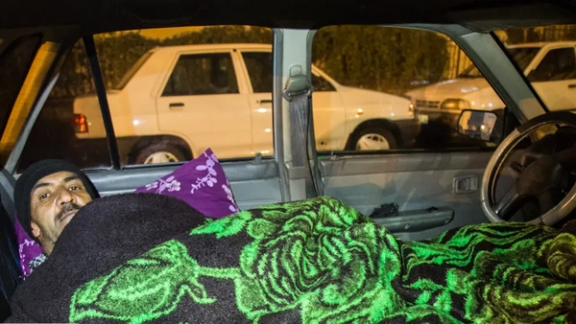
Tehran, a city of contrasts, where the glow of high-rises hides the struggles of those who keep it moving. For many internet taxi drivers from distant provinces, driving through Tehran’s jammed streets isn’t just a job—it’s a desperate bid for survival.
Yet, what remains largely unseen is the reality of where their days end—curled up in the backseat of their cars, parked under bridges, in quiet corners of affluent neighborhoods, or alongside the city’s busy terminals.
High living costs and astronomical rents have turned their cars into homes, making Tehran’s streets a refuge for those who can no longer afford even the most basic shelter. Annual inflation has soared to over 40% in the past five years, pushing many lower middle class Iranian into poverty.
Reza’s nightly struggle: Azadi bus terminal
It’s past midnight near the Azadi Bus Terminal in western Tehran. The last buses have long departed, and the once-bustling station is now eerily quiet. In the shadows, a row of cars belonging to internet taxi drivers—working for Uber-like services called Snapp and Tapsi—sit idle. Their drivers, including Reza, rest inside, preparing for a few hours of broken sleep before the grind begins again.
“This is where I sleep most nights,” Reza says, motioning to his car. The terminal feels slightly safer than parking on random streets, but it’s far from secure. He pulls a thin blanket from the back seat and tucks a worn pillow into the corner. Before settling in, Reza locks his doors carefully, constantly on alert for theft or assault.
“A few months ago, a driver was stabbed over a stolen radio,” he explains. "People are desperate out here."
Originally from Zanjan, Reza, 54, left his family behind to earn a better living in Tehran. But now, trapped in this cycle, he questions the sacrifices. “I wanted to send more money home, but every night I sleep here, I wonder what I’m really gaining,” he says, gazing at the terminal’s flickering lights. “All I think about is going back home, but what’s left for me there?”

Mahmoud’s makeshift home: Ariashahr Square
Ariashahr Square, in western Tehran, remains lively even as the night deepens. Beneath a nearby bridge, Mahmoud, seemingly in his forties, parks his car—the bridge’s underbelly has become his home. Despite the dangers, he’s built a small community with other drivers and laborers who share his plight.
“It feels strange to call this home, but it’s all I have,” Mahmoud says quietly, pulling his jacket tighter against the cold. He drives long hours each day, making barely enough to survive—around 7,000,000 rials ($10). By the end of his shift, he’s too exhausted to speak.
“I use the park’s toilet, and I cook dinner on a portable gas stove on the sidewalk,” he explains. When asked about showering, he sighs. “Sometimes I go a week without one. Other times, I find a public bath.”
Mahmoud recounts a night when he woke to the sound of a fight between two drivers over a parking spot. “It’s the stress,” he says. “Living like this makes you territorial over nothing.”
Still, Mahmoud’s heart remains with his family back in Lorestan, hundreds of kilometers to the south. “My kids think I have a small place here,” he says, his voice heavy. “If they knew I was living like this, sleeping in my car, how would they look at me?”
Mahmoud explains that, with no job opportunities in his hometown and the wages being too low, he was forced to borrow money to buy a car and work as a driver in Tehran.
Kamran’s silent struggles: Saadatabad
In the wealthier district of Saadatabad in northern capital, the contrast between affluence and struggle is stark. Kamran, 31, parks his car in the shadows of a high-rise apartment block, feeling both safer and more invisible.
“I park here because it feels secure,” Kamran says. “But I also feel like I don’t exist. The people here don’t notice you. They don’t want to.”
After a long day of driving passengers through the city, Kamran’s loneliness deepens at night. “Sometimes I close my eyes and imagine I’m at home,” he says. “But when I wake up, I’m just parked on a street, alone.”
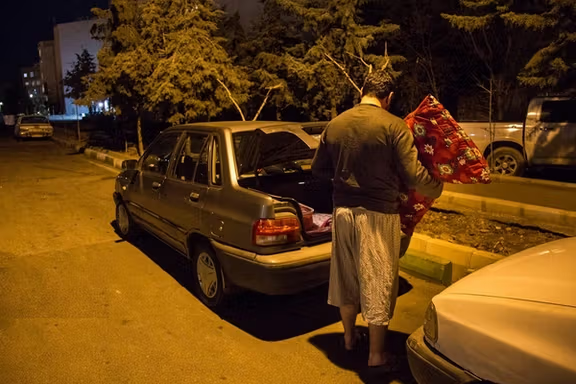
Though Saadatabad offers relative safety, the isolation takes its toll. “There are moments I feel like I’m disappearing,” Kamran says. “If something happened to me, no one would even know.”
A growing crisis: Tehran’s underpass communities
Mahmoud isn’t alone beneath Tehran’s bridges. As he speaks, other drivers begin to gather, sharing cigarettes and quiet conversation. Ali, a driver who’s been sleeping under another bridge near Enghelab Square in central Tehran for over a year, describes the camaraderie among those forced to live in their cars. “We look out for each other,” he says. “It’s dangerous, but at least we have that.”
An economist in Tehran, who requests anonymity for fear of government reaction, explains how the cost of living has pushed low-income workers, like these drivers, to the brink. “Housing prices in Tehran are so inflated that these drivers have no choice but to live in their cars,” he says. “They are the invisible workforce keeping the city running, yet they live in the shadows.”
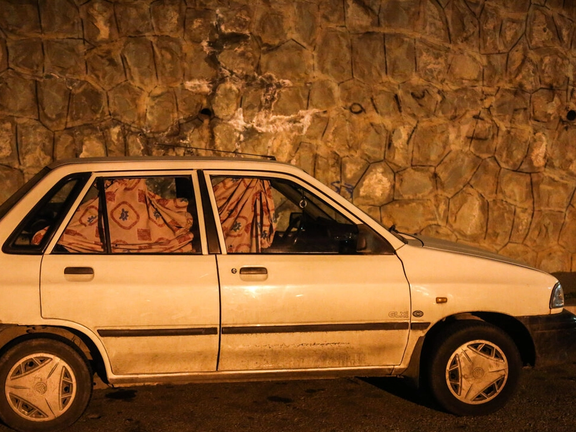
The economist calls this trend the “underpass phenomenon,” where hidden corners of Tehran become makeshift communities for the working poor, including taxi drivers and day laborers. They struggle to afford even basic shelter in the city they help keep alive.
The emotional toll
Psychologist Soheil Rezaei highlights the emotional toll of this forced lifestyle. “Owning a home gives a person a sense of belonging. Without that, people feel lost,” he explains in an interview with Ebtekar daily. “When you’re constantly moving, without a stable place to call home, it damages your spirit.”
Rezaei adds that even renters often avoid personalizing their spaces, knowing they’ll eventually have to leave. For those sleeping in their cars, like Tehran’s internet taxi drivers, the displacement is even more profound. “They’re living only half a life, without stability or peace,” he says.
The emotional damage can be severe. Rezaei has seen rising rates of depression, anxiety, drug addiction, and even suicide among individuals living in such precarious conditions. “We’re facing a future where more and more people are living without a sense of belonging,” he warns, “and this creates a deep societal crisis.”
Mohammad Mashinchian, Senior Governance Researcher at Pittsburgh University, told Iran International in an interview that the Iranian government's approach to managing the country has failed, leading to new forms of poverty.
"This governance is deeply intertwined with the Islamic Republic’s ideology, making it resistant to change or reform. When the government fails to recognize citizens' rights, it creates an environment where working becomes unprofitable for everyone," he said.
Invisible at night, vital by day
For drivers like Reza, Mahmoud, and Kamran, each night in Tehran is a fight for survival. They spend their days navigating the city’s chaos, ferrying passengers from one end of the capital to the other, but at night, they fade into invisibility. Whether parked near Azadi Bus Terminal, under a bridge in Ariashahr, or in the quiet streets of Saadatabad, these drivers are simply trying to make it through another night.
Their resilience is a testament to the human spirit, but their plight reveals the failures of a system that leaves them with no other choice. Tehran’s streets have become their home, and the human cost is growing, one sleepless night at a time.
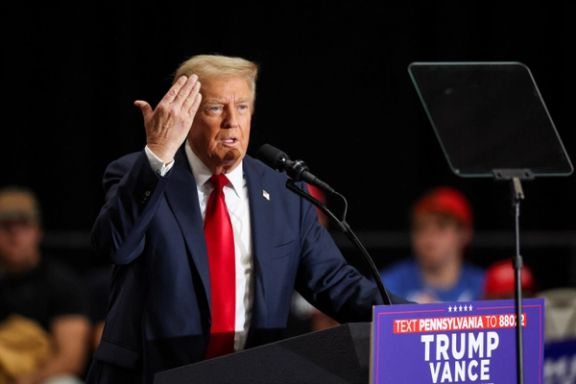
The accused Iranian hacking group who intercepted Republican US presidential candidate Donald Trump's campaign emails have finally found some success in getting their stolen material published after initially failing to interest the mainstream media.
In recent weeks, the hackers began peddling Trump emails more widely to one Democratic political operative, who has posted a trove of material to the website of his political action committee, American Muckrakers, and to independent journalists, at least one of whom posted them on the writing platform Substack. The latest material shows Trump campaign communications with external advisers and other allies, discussing a range of topics leading up to the 2024 election.
The hackers' activities tracked by Reuters provide a rare glimpse into the operations of an election interference effort. They also demonstrate Iran remains determined to meddle in elections despite a September U.S. Justice Department indictment accusing the leakers of working for Tehran and using a fake persona.
The indictment alleged that an Iranian-government linked hacking group, known as Mint Sandstorm or APT42, compromised multiple Trump campaign staffers between May and June by stealing their passwords. In a Homeland Security advisory published earlier this month, the agency warned that the hackers continue to target campaign staff. If found guilty, they face prison time and fines.
The Department of Justice indictment said the leakers were three Iranian hackers working with Iran’s Basij paramilitary force whose voluntary members help the regime to enforce its strict rules and to project influence. Attempts to reach the hackers identified by name in the indictment via email and text message were unsuccessful.
In conversations with Reuters, the leakers - who collectively use the fake persona "Robert" - did not directly address the U.S. allegations, with one saying “Do you really expect me to answer?!”
"Robert" is the same fake persona referred to in the U.S. indictment, according to FBI emails sent to journalists and reviewed by Reuters.
Iran's mission to the United Nations said in a statement that reports of the country's involvement in hacking against the U.S. election were "fundamentally unfounded, and wholly inadmissible," adding that it "categorically repudiates such accusations." The FBI, which is investigating Iran’s hacking activity against both presidential campaigns in this election, declined to comment.
David Wheeler, the founder of American Muckrakers, said the documents he shared were authentic and in the public interest. Wheeler said his goal was to “expose how desperate the Trump campaign is to try to win" and to provide the public with factual information. He declined to discuss the material's origin.
Without making any specific references, the Trump campaign said earlier this month that Iran's hacking operation was “intended to interfere with the 2024 election and sow chaos throughout our democratic process,” adding any journalists reprinting the stolen documents “are doing the bidding of America’s enemies.”
In 2016, Trump took a different position when he encouraged Russia to hack into Hillary Clinton’s emails and provide them to the press.
LEAK OPERATION
The leak operation started around July when an anonymous email account, noswamp@aol.com, began communicating with reporters at several media outlets, using the Robert moniker, according to two people familiar with the matter. They initially contacted Politico, the Washington Post and the New York Times, promising damning internal information about the Trump campaign.
In early September, the accused Iranian hackers used a second email address, bobibobi.007@aol.com, in a fresh round of overtures, including to Reuters and at least two other news outlets, the two people familiar with the matter, said.
At the time, they offered research compiled with public information by the Trump campaign into Republican politicians JD Vance, Marco Rubio and Doug Burgum, all of whom were under consideration as Trump’s running mate.
The vice presidential reports were authentic, a person familiar with the Trump campaign told Reuters. Neither Politico, the Washington Post, the New York Times, nor Reuters published stories based on the reports.
New York Times spokesperson Danielle Rhoades Ha, said the newspaper only published articles based on hacked material “if we find newsworthy information in the materials and can verify them.”
In an email, the Washington Post referred Reuters to past comments made by its executive editor, Matt Murray, who said the episode reflected the fact that news organizations "aren’t going to snap at any hack" provided to them. A spokesperson for Politico said the origin of the documents was more newsworthy than the leaked material. Reuters did not publish this material because the news agency did not believe it was newsworthy, a spokesperson said.
Both AOL email accounts identified by Reuters were taken offline in September by its owner Yahoo, which worked with the FBI before the indictment to trace them to the Iranian hacker group, according to two people familiar with the investigation. Yahoo did not respond to a request for comment.
Before losing email access, Robert suggested reporters might need an alternate contact and offered a telephone number on the encrypted chat application Signal. Signal, which is more difficult to monitor by law enforcement, did not return messages seeking comment.
Some senior U.S. intelligence and law enforcement officials have said that Iran's interference efforts this election cycle are focused on denigrating Trump as they hold him responsible for the 2020 American drone assassination of former Iranian military general Qassem Soleimani.
Thus far, the already-published leaks do not appear to have changed the public dynamics of the Trump campaign.
MUCKRAKERS
On Sept. 26, North Carolina-based American Muckrakers, began publishing internal Trump campaign emails. Active since 2021, the PAC has a history of publicizing unflattering material about high-profile Republicans. According to public disclosure reports, it is funded through individual, small-dollar donors from around the country.
On its website, American Muckrakers said the leaks came from “a source,” but, ahead of the publication last month, the group publicly asked Robert to get in touch. “HACKER ROBERT, WHY THE F DO YOU KEEP SENDING THE TRUMP INFORMATION TO CORPORATE MEDIA?” the group said in a post to X. “Send it to us and we'll get it out.”
When asked whether his source was the alleged Iranian persona Robert, Wheeler said “that is confidential” and that he had “no confirmation of the source's location.” He also declined to comment on whether the FBI had warned him that the communication was the product of a foreign influence operation.
In one example, Muckrakers published material on Oct. 4th purporting to show an unspecified financial arrangement with lawyers representing former Presidential candidate Robert F. Kennedy Jr. and Trump. RFK Jr. attorney Scott Street, said in an email to Reuters he could not speak publicly about the incident. Reuters confirmed the authenticity of the material.
Muckrakers subsequently published documents from Robert about two high-profile races. It included alleged campaign communication about North Carolina Republican gubernatorial candidate Mark Robinson and Florida Republican representative Anna Paulina Luna, both of whom were endorsed by Trump.
The exchange about Robinson concerned an attempt by Republican adviser W. Kirk Bell, to seek guidance from the Trump camp after the scandal over comments attributed to Robinson on a pornographic forum. Robinson has previously denied the comments. The other message came from a Republican adviser sharing information with the campaign about Luna's personal life.
Robinson and Luna’s campaigns did not return messages seeking comment.
One of the few journalists contacted by Robert who did publish material was independent national security reporter Ken Klippenstein, who posted the vice presidential research documents to Substack late last month. Robert confirmed to Reuters that they gave the material to Klippenstein.
Substack did not respond to a question about its policies concerning hacked material.
After the story, Klippenstein said FBI agents contacted him over his communication with Robert, warning that they were part of a “foreign malign influence operation.” In a post, Klippenstein said the material was newsworthy and he chose to publish it because he believed the news media should not be a "gatekeeper of what the public should know."
A spokesperson for Reuters, which received similar notifications from the FBI, said, "We cannot comment on our interactions, if any, with law enforcement." An FBI spokesperson declined to comment on its media notification effort.
Wheeler said he had new leaks in store “soon” and that he would continue to publish similar documents as long as they were “authentic and relevant.”
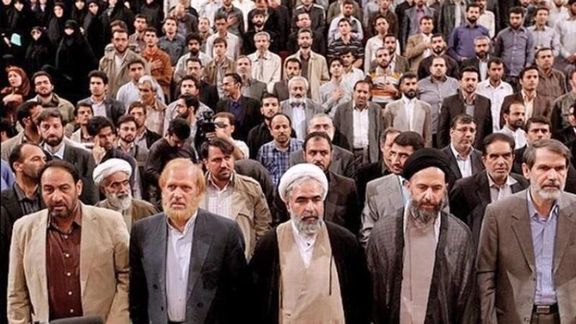
Islamic radical conservatism in Iran, dominant in government for the past two decades, has revealed its dangers through "purification" efforts, an adventurous foreign policy, erosion of the middle class, and the weakening of the private sector.
After two decades of alienating the majority of Iranians—leading over 61% of eligible voters to abstain from the June 2024 presidential election—some within the system now appear to be considering a revival of pre-2005 traditional conservatism.
A report from the centrist website Entekhab noted on Wednesday that the current structure of Iran’s conservative camp appears disjointed, especially after their defeat in the July presidential election, which saw the election of non-factional candidate Masoud Pezeshkian with the backing of “reformist” groups.
Since the disputed 2009 election, which secured ultraconservative Mahmoud Ahmadinejad’s second term, conservatives have attempted to present a unified front ahead of every parliamentary and presidential election. However, these attempts repeatedly fractured, and if not for interventions from Supreme Leader Ali Khamenei and the Guardian Council, the reformist camp might have reclaimed power.
This infighting has steadily diminished the conservative camp, particularly over the past 11 years since pragmatist Hassan Rouhani’s presidency. What remains is a core group of 100 to 160 ultraconservative politicians, primarily linked to the Paydari Party, who advocate for a non-democratic Islamic government rather than the Islamic Republic's semi-democratic structure.
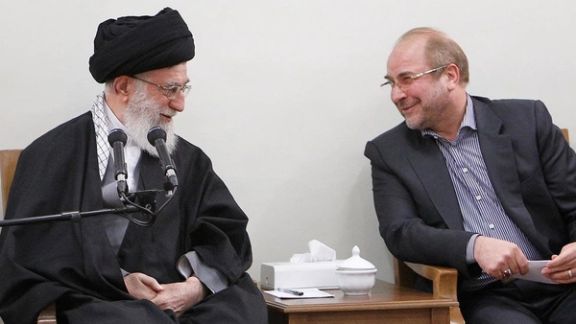
Their ranks have now dwindled to fewer than 80 parliament members and a handful of others in appointed roles, such as those in the Expediency Council.
According to Entekhab, “moderate” conservatives now hold the upper hand in Iranian politics, with Majles Speaker Mohammad Bagher Ghalibaf leading efforts to restore the conservative camp to its pre-2005 stance. The report noted that Ghalibaf has actively worked to limit the influence of Paydari members within the Majles.
This narrative, however, is questionable. To secure his role as Speaker, Ghalibaf maneuvered between Paydari members, other conservatives, and a few pro-reform MPs, ultimately winning the position with votes from the latter. By spring 2024, Paydari had dwindled to just over 60 members, marking one of its lowest points in popularity and membership.
President Pezeshkian disclosed on the day of the Majles vote for his cabinet in August that it was, in fact, Supreme Leader Ali Khamenei—not Ghalibaf—who ensured that all ministers received the necessary vote of confidence from parliament.
Over the past 20 years, especially during Ahmadinejad's presidency, hardliners succeeded in sidelining many moderate conservatives, including former Majles Speaker Ali Akbar Nateq Nouri. In recent years, they have also marginalized other influential conservatives, such as the Larijani brothers—former Chief Justice Sadeq Amoli Larijani and former Majles Speaker Ali Larijani—as well as former President Hassan Rouhani and nearly all of his "pragmatist" allies.
Now, as the country's economy is in its weakest point, the public, as well as politicians in Iran are beginning to remember what Ahmadinejad and the Raisi administration have done to a better economy that existed in Iran until 2005.
Ahmadinejad’s presidency brought sanctions, international isolation, and squandered a massive windfall from soaring oil prices, leaving the treasury depleted by 2013. According to President Pezeshkian’s reserved remarks, the Raisi administration also left virtually nothing for the new government. On his first day in office, Pezeshkian had to borrow from the Khamenei-controlled foreign currency reserve to settle government debts to farmers.
While the shift toward a more moderate conservatism is being spearheaded by Parliament Speaker Ghalibaf, Pezeshkian has shown signs of aligning with hardliners to secure his position.
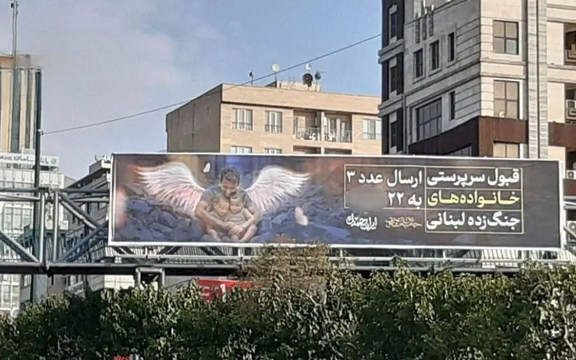
Iran is imploring citizens to mine mostly empty pockets for Lebanon despite five years of 40% annual inflation and a spiraling currency crisis as Hezbollah militants backed by the Islamic Republic take heavy blows from archenemy Israel.
Over the past week, banners and messages have appeared on highways and over bridges across Tehran urging people to donate to war-affected Lebanese. Iran's Islamic Revolutionary Guard Corps established Hezbollah in 1982 and has heavily armed and funded the group in the decades after.
The fundraising campaign comes as Iran’s own economy is under pressure, with inflation and the rising cost of living taking a toll on livelihoods.
While the level of Iranian assistance to Hezbollah has fluctuated over the years, US officials estimated in 2018 that Iran transfers around $700 million annually to Hezbollah.
A banner in Tehran asked citizens to send an SMS to express readiness to donate to Lebanese while similar campaigns on state TV and through text messages from the paramilitary Basij group encourage people to donate cash, gold, or even to financially sponsor a Lebanese family.
The efforts have drawn criticism from ordinary Iranians, who feel that the government is prioritizing foreign interests over domestic needs.
“It was revealed that the Islamic Republic was sending funds of 50 million dollars per month to support this group," Ali Shirazi, an Iranian journalist, told Iran International TV.
"But this is not the only expense. Military, weaponry, drones, and missile assistance are also provided, and the reconstruction of damaged buildings falls on Iran’s budget,” he added.
Iran's financial and military support for Hezbollah has come under more scrutiny following Israeli strikes on Hezbollah-linked financial institutions, including the Al-Qard al-Hasan bank in Beirut which may have disrupted Hezbollah's access to funds.
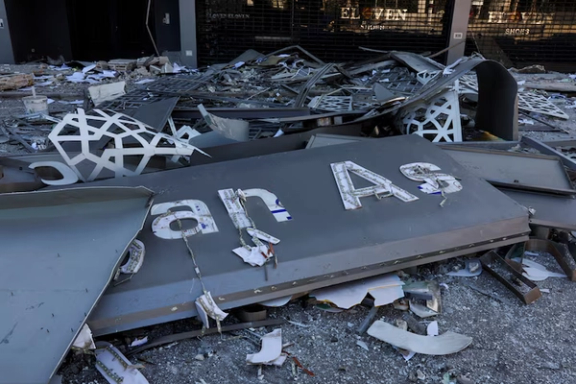
"Bunch of freeloaders"
Discontent with the donations campaign is evident among Iranians, many of whom expressed their frustration to Iran International via messaging apps which protect their anonymity.
“The rise in currency exchange rates, the dollar, and the increasing prices of gold have had a very negative impact, destroying the weaker and lower-income classes,” a Tehran resident said.
“People are now finding their food in garbage bins. More than two million students couldn’t attend school this year,” he added.
Others called for redirecting funds towards addressing domestic issues rather than supporting foreign militant groups.
“If we want to help, we prefer to support our fellow compatriots, especially those in need in provinces like Sistan and Baluchestan, rather than sending money to Hamas and Hezbollah,” said a businessman from the northern city of Rasht.
The government’s push for donations was described as out of touch with the reality faced by most Iranians. “For 45 years, we haven’t heard any good news from the media. If the money spent on Lebanon, Syria, and Palestine were spent in Iran, everything would flourish,” commented another citizen.
As inflation continues to rise, with the US dollar trading at 690,000 rials and predictions of further price increases by the end of the year, Iranians are strained.
“I don’t know how long we have to pay the price for Hassan Nasrallah, Ismail Haniyeh and a bunch of freeloaders," a retired citizen said referring to slain Hezbollah and Hamas leaders, "but the impact it’s had has paralyzed everyone’s lives".
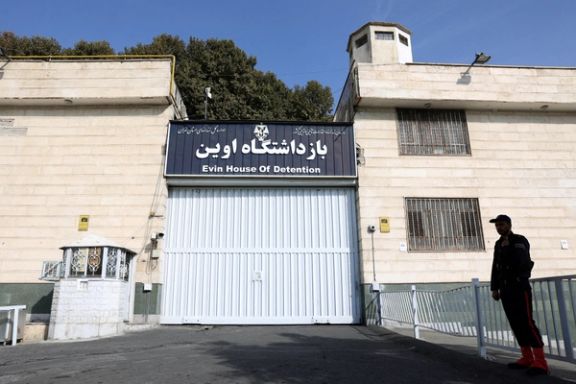
A group of 22 female inmates at Evin Prison have issued a plea for the immediate medical care of their fellow inmate, renowned human rights activist Narges Mohammadi.
The women have expressed grave concerns over Mohammadi’s deteriorating health, citing severe chest pain due to a heart condition, a lump in her breast and chronic back pain.
Despite requests from medical professionals, including specialists and the prison’s medical department, prison authorities have repeatedly denied Mohammadi’s transfer to a hospital citing orders from superiors.
The inmates' letter also raised concerns about the broader issue of medical neglect in Evin Prison and highlighted dire conditions faced by those labeled "security prisoners." The term is mainly used for political prisoners and detained protesters.
The signatories argue that if these women were ordinary prisoners, they likely would have been granted parole on medical grounds.
Denial of necessary medical treatment has sparked outrage among the prison population and human rights advocates.
Iranian authorities are subjecting Mohammadi to torture by deliberately denying her healthcare, Amnesty International said in a post on X on Thursday.
Earlier in October, Mohammadi’s family issued a statement accusing Iran's security and judicial authorities of preventing her from being transferred to a hospital for an angiography procedure on several occasions.
Mohammadi had a 75% blockage in her main artery in 2022, when a stent was placed, according to a member of her family. An angiography helps diagnose a heart problem and may be a medical necessity for someone with an arterial stent.
Mohammadi has faced multiple arrests, trials, and prison sentences due to her human rights advocacy. Over the years, she has been detained numerous times, spending approximately six years in prison for her activism. Most recently, she was arrested in November 2021 and was sentenced to a total of 13 years and 9 months in prison, with additional charges still pending.
In addition to imprisonment, Mohammadi has been sentenced to 154 lashes, four months of community service as a street cleaner, a two-year travel ban, a two-year ban on using smartphones, monetary fines and exile.
One of her latest court hearings, held in her absence in June, addressed new charges of “propaganda against the state.” These were brought against her for speaking out about sexual harassment and assault allegations against imprisoned journalist Dina Ghalibaf and for advocating the boycott of elections. This week, a Tehran court sentenced her to six more months in prison for charges of assaulting a prison guard.